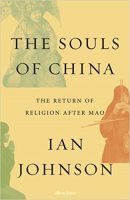The Souls of China: The Return of Religion After Mao
by Ian Johnson
(Allen Lane, £25)
 The last book on China I reviewed, Rob Schmitz’s Street of Eternal Happiness, was largely about people cashing in on the country’s new economic freedoms. This one is about those for whom “the thrill of prosperity has faded”, who have money but are still searching for meaning in their lives.
The last book on China I reviewed, Rob Schmitz’s Street of Eternal Happiness, was largely about people cashing in on the country’s new economic freedoms. This one is about those for whom “the thrill of prosperity has faded”, who have money but are still searching for meaning in their lives.
China is experiencing a “Great Awakening”. Hundreds of temples, mosques and churches are opening each year, drawing millions of new worshippers. Johnson estimates that among a population of 1.38 billion there are 200 million Buddhists and Daoists, 50 to 60 million Protestants (the fastest-growing faith group), 20 to 25 million Muslims and about 10 million Catholics. In addition, there are 175 million people who follow some folk religion practices or esoteric imports such as Baha’i and Gandhiism.
It’s a remarkable transformation in a country where, over the space of a century, there was a ferocious attempt to eradicate every trace of religion, and where, during the Cultural Revolution, temples, shrines and churches were razed and priests, monks and nuns humiliated and scattered.
It’s a transformation that — for the moment — has the approval of the Communist party, which has come to view religion not as superstition or a potential cause of unrest but as a source of morality and social cohesion. Rather than crushing the resurgence of faith, the government is attempting to co-opt the believers, while presenting their rites and rituals as an expression not of religion but of “culture”. Practitioners and adherents take a very different view. “If I could summarise the aspirations of the people in this book in one word,” Johnson writes, “it would be ‘heaven’.”
Chronicling a year of spiritual life as marked out by the traditional lunar calendar, he reports on the yinyang men, or Daoist priests, who are charged with fortune-telling, reciting scriptures and making music for births, marriages and deaths; on the masters of meditation at their hilltop retreats; and on the Whole Heart Philanthropic Salvation Tea Association, whose volunteers, at a shrine 40 miles from central Beijing, brew endless cups for pilgrims drawn by Our Lady of the Azure Clouds.
He spends time, too with the head of a Protestant church in Chengdu, a man who, had he continued as an activist, might be under house arrest and denied access to the internet. Instead, as a pastor and seminary teacher, he can influence hundreds, help to plant churches across the country and run charities for street people and the families of political prisoners.
Johnson, who was born in Montreal, is a Pulitzer Prize-winning reporter for The New York Times and The New York Review of Books. His book, the result of some 15 years’ work in China, is not just scholarly (the last 50 pages are comprised of notes plus index) but sprightly. It’s written in prose that’s rhythmical but unshowy, with scarcely a metaphor, and with a gentle sense of humour. During a retreat at a Daoist temple, he observes that he is making notes, videoing and recording talks, “building up gigabytes of information about how to leave the material world behind.”
This, we’re regularly assured, is “the Chinese century”. If so, then Johnson’s book is essential reading for anyone who wants to understand it. MK
